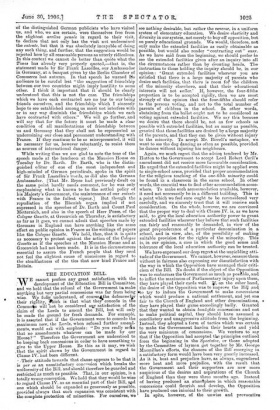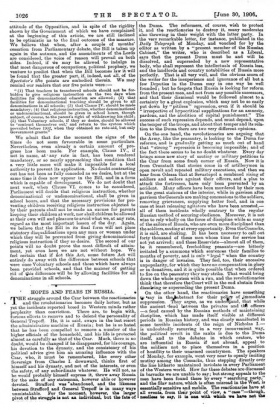THE EDUCATION BILL.
WE cannot profess any great satisfaction with the development of the Education Bill in Committee, and we hold that the refusal of the Government to make anything but very partial concessions was far from being wise. We fully, understand, of course4the defences far rigidity, aidity, 4Ihich is that what they concede in tne _Commois will 'not be considered may satisfaction of the "claim of the Lords to amend the Bill, but will only be made the ground for fresh demands. For example, it is asserted that if the Government were to concede the _maximum now, the Lords, when refused further amend- inents, would ask with emphasis : "Do you really raefin that no amendments whatever can be made by our House? " Therefore the Government are understood. to be keeping back concessions in order to have something to ,give to the Upper House. Be this as it may, we wish ,that the, spirit shown by the Government in regard to Clause IV. had been different. • ,Their. attitude towards that clause appears to be that it is per se an unsatisfactory concPqsion which breaks the uniformity of the Bill, 'and should therefore be guarded and restricted as much as possible. That,. in our opinion, is a totally wrong conception. We hold that they would be wise .to regard Clause IV. as an essential part of .their Bill, and one which should be expanded as generously as possible, .pro.vided always that such expansion was consistent with the complete protection of minorities. For ourselves, we see nothing desirable, but rather the reverse, in a uniform system of elementary education. We desire elasticity and diversity in our system, not merely to buy off opposition, but on purely educational grounds. We would, therefore, not only make the extended facilities as easily obtainable as possible, but would also render "contracting out" easy. As we have said from the beginning, we should prefer to see the extended facilities given after an inquiry into all the circumstances rather than by Counting heads. The instruction to those holding the inquiry should be, in our opinion: ' Grant extended facilities wherever you are satisfied that there is a large majority of parents who desire such facilities, that there is room for the children of the minority elsewhere, and that their educational interests will not suffer.' If, however, the four-fifths proportion is to be accepted rigidly, then we are moat strongly of the opinion that the four-fifths should refer to the persons voting, and not to the total number of parents of children in the school. In other words, abstaining from the ballot ought not to be considered as voting against extended facilities. We say this because we desire that there should be, not as few schools as possible with extended facilities, but as many as possible, granted that those facilities are desired by a large majority of the parents, and that they can be given without injury to the minority. To accept Mr. Birrell's metaphor, we want to see the dog dancing as often as possible, provided he dances without injuring his neighbours.
Again, we much regret that the advice tendered by Mr. Hutton to the Government to accept Lord Robert Cecil's amendment did not receive more favourable consideration. He urged that the extended facilities might be applied even to single-school areas, provided that proper accommodation for the religious teaching of the one-fifth minority could be found in a classroom in the same school. In other words, the essential was to find other accommodation some- where. To make such accommodation available, however, it need not necessarily be in a different building. This is a point which we feel sure ought to be reconsidered very carefully, and we sincerely trust that it will receive such consideration. On the whole, however, we are convinced that the proper way to deal with Clause IV. is, as we have said, to give the local education authority power to grant extended facilities wherever they believe that such facilities can fairly and reasonably be demanded, in view of the great preponderance of a particular denomination in a school, and in view, also, of the possibility of making suitable provision for the rights of the minority. This is, in our opinion, a case in which the good sense and tolerance of the local education authority can be trusted.
We have expressed our deep regret at the unyielding atti- tude of the Government. We cannot, however, censure them without in fairness also expressing our dissatisfaction with the way in which the Opposition have managed their criti- cism of the Bill. No doubt if the object of the Opposition was to embarrass the Government as much as posAble, and to inflict the maximum of Parliamentary injury upon them, they have played their cards well. o.n the other hand, the desire of the Opposition was to improve the Bill and OW UT to induce the Government to make concessions which would produce a national settlement, and Yet one fair to the Church of England and other denominations, s they have played their game exceedingly badly. Granted that they wanted to obtain bond-fide concessions and not to make political capital, they should have assumed a conciliatory and unaggressive attitude from the beginning. Instead, they adopted. a form of tactics which was certain to make the Government harden their hearts and yield the very minimum of concessions. We venture to say that if the Opposition had accepted tie principles outlined from the beginning in the Spectator, or those adopted by the Committee of laymen got together by Mr. George Macmillan's efforts, the chances of the Bill emerging in a satisfactory form would have been very greatly increased. As it is, heat and prejudice have, as always, engendered more heat and more prejudice, with the result that the Government and their supporters are now more suspicious of the desires and aspirations of the Church of England than they were three months ago. Instead of having produced an atmotphere in which reasonable concessions could flourish and develop, the Opposition have produced one inimical to their growth. In spite, however, of the unwise and provocative attitude of the Opposition, and in spite of the rigidity shown by the Government of which we have complained at the beginning of this article, we are still inclined to be optimistic as to the final outcome of the measure. We believe that when, after a couple of months' cessation from Parliamentary debate, the Bill is taken up again in the autumn, and the amendments of the Lords are considered, the voice of reason will prevail on both sides. Indeed, if we may be allowed to indulge in that most dangerous of occupations, political prophecy, we venture to predict that when the Bill becomes law it will be found that the greater part, if, indeed, not all, of the k9peetator's filre points are embodied therein. We may remind our readers that our five points were :- " (1) That teachers in transferred schools should not be for- bidden to give religious instruction on the two days when facilities for denominational education are allowed ; (2) that facilities for denominational teaching should be given to all denominations in all schools; (3) that Clause IV. should be made mandatory; (4) that religious instruction, whether denominational or undenominational, should be given in school hours, though subject, of course, to the parent's right of withdrawing his child ; (5) that Voluntary schools, if they so desire, should be allowed to 'contract themselves out,' and return to the system which prevailed before 1902, when they obtained no rate-aid, but only Government grants."
We admit that for the moment the signs of the times do not seem favourable in some particulars. Nevertheless, even already a certain amount of pro- gress has been made. For example, Clause IV., if not in name, at • any rate in fact, has been rendered mandatory, or so nearly approaching that condition that a very little more will make it impossible for a local authority to prevent its application. No doubt contracting out has not been as fully conceded as we desire, but at the same time it does now appear in the Bill, and in a form which is capable of development. We do not doubt that next week, when Clause VI. comes to be considered, Parliament will decide that religious instruction, whether denominational or undenominational, shall be given in school hours, and that the necessary provisions for pre- venting children receiving religious instruction objected to by their parents shall not be made an excuse for parents keeping their children at work, nor shall children be allowed at their own will and pleasure to avoid what we, at any rate, regard as the most important lesson of the day. Again, we believe that the Bill in its final form will not place statutory disqualifications upon any man or woman under which they will be prevented from giving denominational religious instruction if they so desire. The second of our points will no doubt prove the most difficult of attain- ment, yet even here we are not without hope. We feel certain that if not this Act, some future Act will entirely do away with the difference between schools that were once Voluntary schools and those which have always been provided schools, and that the manner of getting rid of tohis difference will be by allowing facilities for all denominations in all, schools.



























































 Previous page
Previous page